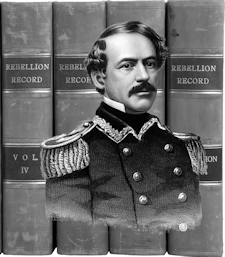February 3.—In accordance with the decision of the Administration of the United States, the privateersman who had been confined in the City Prison, were released from that place and confined as political prisoners in Fort Lafayette. The persons captured on the British ship M. S. Perry, and held as witnesses, were released entirely.
—In the Superior Court at Salem, Mass., Henry M. Bragg, Francis W. Bayley, Isaac M. Daggett, Martin L. Stevens, Joseph S. King, and George W. Edwards, all of Haverhill, indicted for tarring, feathering, and riding on a rail, in August last, the editor of the Haverhill Gazette, Mr. Ambrose L. Kimball, were severally held to bail for trial, in the sum of one thousand dollars each.
—In the United States Senate, Mr. Chandler presented resolutions from the Legislature of Michigan reaffirming loyalty to the Government and hatred of traitors, and asking the Government to speedily put down the insurrection, favoring the confiscation of the property of the rebels, and asking that, as slavery is the cause of the war, it be swept from the land.
—By the operation of Earl Russell’s circular of neutrality, the privateer Nashville was sent off from Southampton, Eng., to-day. The Union gunboat Tuscarora was anchored off Cowes, where the rebel vessel passed her. The Tuscarora steamed up and was ready to start in chase of her, when she was stopped by the British frigate Shannon, (fifty-one,) to be detained for twenty-four hours, in accordance with the strict letter of international law.
The London Times and Post congratulate the English people on their seeing the last of both vessels, as well as of all other American naval belligerents.


